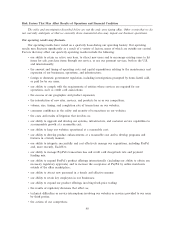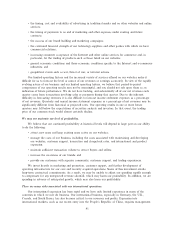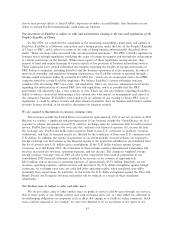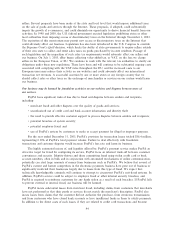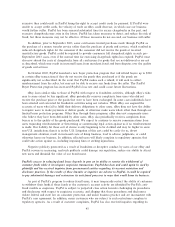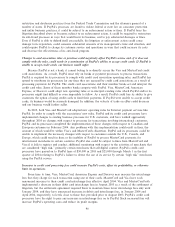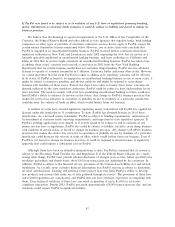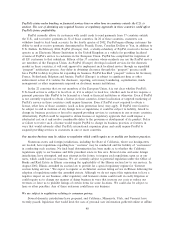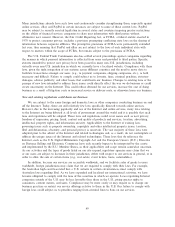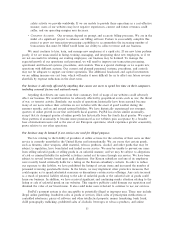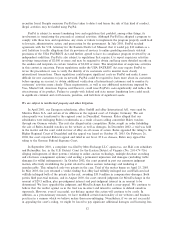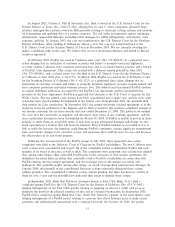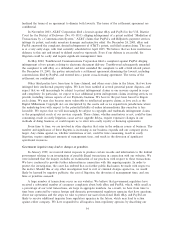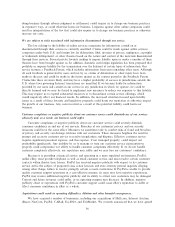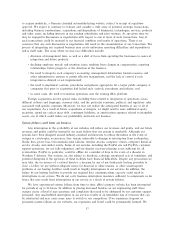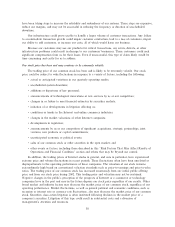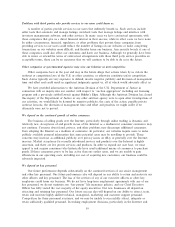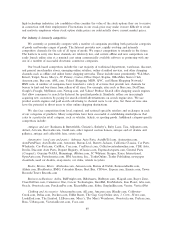eBay 2003 Annual Report Download - page 52
Download and view the complete annual report
Please find page 52 of the 2003 eBay annual report below. You can navigate through the pages in the report by either clicking on the pages listed below, or by using the keyword search tool below to find specific information within the annual report.PayPal's Ñnancial success will remain highly sensitive to changes in the rate at which its customers fund
payments using credit cards rather than bank account transfers or existing PayPal account balances.
PayPal's proÑtability could be harmed if the rate at which customers fund using credit cards goes up.
PayPal pays signiÑcant transaction fees when senders fund payment transactions using credit cards,
nominal fees when customers fund payment transactions by electronic transfer of funds from bank
accounts, and no fees when customers fund payment transactions from an existing PayPal account balance.
During 2003, senders funded 55% of PayPal's payment volume using credit cards. Senders may resist
funding payments by electronic transfer from bank accounts because of the greater protection oÅered by
credit cards, including the ability to dispute and reverse charges if merchandise is not delivered or is not as
described, because of frequent Öier miles or other incentives oÅered by credit cards, because of the ability
to defer payment, or because of generalized fears regarding privacy or loss of control in providing bank
account information to a third party.
PayPal has limited experience in managing and accounting accurately for large amounts of customer
funds. PayPal's failure to manage these funds properly would harm its business.
PayPal's ability to manage and account accurately for customer funds requires a high level of internal
controls. PayPal has neither an established operating history nor proven management experience in
maintaining, over a long term, these internal controls. As PayPal's business continues to grow, it must
strengthen its internal controls accordingly. PayPal's success requires signiÑcant public conÑdence in its
ability to handle large and growing transaction volumes and amounts of customer funds. Any failure to
maintain necessary controls or to manage accurately customer funds could diminish customer use of
PayPal's product severely.
Our failure to manage growth could harm us.
We are currently expanding our headcount, facilities, and infrastructure in the U.S., internationally,
and with PayPal. We anticipate that further expansion will be required to address potential growth in our
customer base and number of listings and payment transactions, as well as our expansion into new
geographic areas, types of goods, and alternative methods of sale. This expansion has placed, and we
expect it will continue to place, a signiÑcant strain on our management, operational and Ñnancial resources.
The areas that are put under strain by our growth include the following:
‚The Websites. We must constantly add new hardware, update software and add new engineering
personnel to accommodate the increased use of our and our subsidiaries' websites and the new
products and features we are regularly introducing. This upgrade process is expensive, and the
increased complexity of our websites increases the cost of additional enhancements. If we are
unable to upgrade our technology, transaction processing systems, security infrastructure, or network
infrastructure to accommodate increased traÇc or transaction volume, our business could be
harmed. Adverse consequences could include unanticipated system disruptions, slower response
times, degradation in levels of customer support, impaired quality of users' experiences of our
services, impaired quality of services for third-party application developers using our externally
accessible Application Programming Interface, or API, and delays in reporting accurate Ñnancial
information. Our failure to provide an increasing level of new features and functionality in a cost-
eÅective manner also could result in these consequences. We may be unable to eÅectively upgrade
and expand our systems in a timely manner or to integrate smoothly with our existing systems any
newly developed or purchased technologies or businesses such as PayPal. We are in the midst of
signiÑcant multi-year projects to enhance our current technical architecture. If these projects are
not successful, our business could be harmed. We have experienced periodic unscheduled
downtime. Continued unscheduled downtime would harm our business and also could anger users of
our websites and reduce future revenues.
‚Customer Support. We are expanding our customer support operations to accommodate the
increased number of users and transactions on our websites and the increased level of trust and
50


